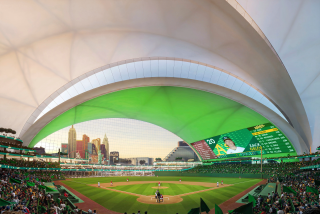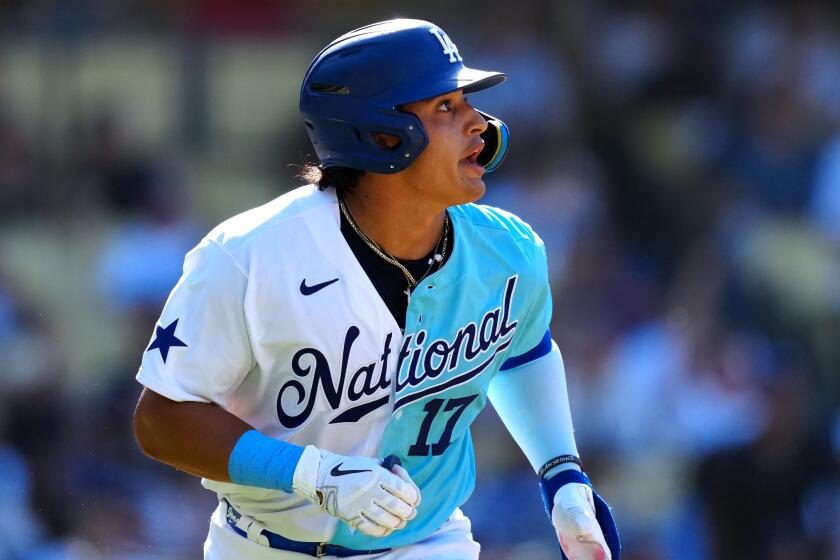Column: NFL stadium promoters confront an expensive question: What if the fans stay away?
We may be witnessing a winter of discontent for the National Football League, which until now has had its sunny way with fans, television viewers, and municipalities.
A harsher climate has been developing recently. The most immediate concern for the league may be a fall-off in television viewership, its lifeblood. But its ability to extract public financing for multibillion-dollar stadiums may also not be what it once was.
In San Diego, a proposal to finance a convention center and downtown stadium for the NFL Chargers via a hike in the city hotel tax is heading for a loss on Nov. 8, according to a recent poll — despite strong support from Mayor Kevin Faulconer. Stadium proposals elsewhere have fared better by avoiding voter input. A plan to provide $750 million in public financing for a $1.9-billion stadium to lure the Oakland Raiders to Las Vegas won approval on Oct. 14 through a backroom deal among state legislators in Carson City.
We still are very much opposed to legalized gambling on sports....We think that it has an impact on the integrity of our game.
— NFL Commissioner Roger Goodell, pondering a Raiders move to Las Vegas
The reason for the political subterfuge may be that voters are finally getting wise to two facts that sports economists and city planners have known for decades: Sports venues typically contribute very little to civic economic growth, and they often reach much more deeply into the public’s pocket than is evident at first glance.
That’s partially because major facilities like stadiums and sports arenas can impose millions of dollars in hidden costs. Municipalities hankering to attract a pro franchise, or keep one they already have, give away city land at a cut rate, offer tax abatements for decades into the future, or front the cost of police and fire protection without a clear plan for reimbursement.
Inglewood city leaders sold their taxpayers on the stadium that will be home to the Los Angeles Rams starting in 2019 with promises that it would require “no taxpayer dollars.” That turned out to be untrue: The plan filed by the project’s developers entailed tax breaks and reimbursements to the project for roadwork, utility construction, security, medical services, and shuttles to off-site parking that could reach $100 million. Those terms didn’t get fully vetted by the public, however, because city leaders OKd the deal without voter approval.
Another hidden subsidy is tax-exempt financing. A recent study by the Brookings Institution documented the birth of publicly financed sports stadiums in the mid-1950s, assisted in 1968 by a change in federal law. The law rendered state and local bonds taxable if more than 25% of the proceeds were to benefit a nongovernmental entity or private business — but exempted sports stadiums, which typically had private franchises as tenants, from the rule. Congress attempted to tighten the rule on stadiums in 1986, but left gaping loopholes.
Since 2000, according to the report, the construction or renovation of 13 NFL stadiums has been subsidized by federal taxpayers, as have 12 major league baseball parks, seven National Basketball Assn. arenas, and six National Hockey League rinks. Only 10 venues have been built entirely with private funds. Brookings estimates the revenue lost to federal taxpayers through these arrangements at $3.7 billion.
It’s not unusual for taxpayers to be left on the hook. St. Louis still owes some $140 million on the domed stadium the Rams deserted to move back to Los Angeles.
San Diego made a string of bad deals over the years to keep the NFL Chargers. The biggest blunder was a 1997 ticket guarantee under which the city was obligated to pay the team any shortfall below the price of 60,000 tickets per game. This cost the city nearly $37 million up to 2004, leaving it with the equivalent of only $1 million a year in rent.
That same year, the city borrowed $68 million to renovate Qualcomm Stadium, which it’s still paying off at the rate of nearly $5 million a year. The Chargers owe about $3 million in rent, but they get credits for concessions sold at the games; because of that and other conditions, the city effectively pays the Chargers to play.
San Diegans are therefore pardonably suspicious about Measure C, the ballot initiative that would increase the city hotel tax by nearly one-third, to 16.5%, to pay for a downtown stadium and convention center complex. The measure was drafted by the Chargers, who have contributed about $7.5 million to the campaign to get it approved; opponents have raised about $40,000, mostly from a hospitality industry fearful that the higher tax will keep tourists away.
Chargers owner Dean Spanos reached an agreement with Mayor Faulconer promising that the team will cover any construction or land acquisition overruns and committing to staying in town until the stadium debt is paid off. But opponents observe that these promises aren’t written into Measure C and could be easily repudiated.
In the National Football League, greener pastures always seem to beckon, if only as bargaining chips. Raiders owner Mark Davis began dickering with Las Vegas once it became clear that Oakland was loath to promise more than $200 million in infrastructure construction to keep the team in the aging Oakland Coliseum.
But Las Vegas may yet turn into a mirage. Any relocation move must be approved by 24 team owners, or three-fourths of the 32. That’s anything but a chip-shot field goal. Although the Raiders provided the league with a study finding that pro football would thrive in Vegas, the league is planning its own study, possibly to be completed in time for an owners’ meeting Dec. 14.
Even billionaire Las Vegas casino magnate Sheldon Adelson, who lobbied relentlessly for the state deal, has reminded the public that the whole arrangement is dependent on reaching a suitable deal with the Raiders and, by extension, the NFL. In an interview with Reuters, he said: “I told my people, ‘I could live with the deal, I could live without the deal. Here’s the way it’s gonna go down. If they don’t want it, bye-bye.’”
Regardless of the marketing viability of a team in Las Vegas, the move could also run into the league’s traditional hostility to sports betting, which is legal only in Nevada and Delaware. “We still are very much opposed to legalized gambling on sports,” NFL Commissioner Roger Goodell Goodell asserted after a league meeting Oct. 19.
What’s often overlooked in the excitement of bringing a sports franchise to a new city is that success at the turnstiles and concession booths is linked to success on the field. Stan Kroenke, who became sole owner of the Rams in 2010, implied that lack of enthusiasm for the team in St. Louis prompted him to bring it back West. But what was to like? Under his ownership the team lost almost twice as many games as it won and hadn’t made the playoffs since 2004.
Demand for tickets at the San Francisco 49ers’ new home in Santa Clara has been fading since Levi’s Stadium opened in 2014, contributing to rent disputes between the team and the city. But the 49ers haven’t had a winning season in Santa Clara, going 5-11 last year and 1-6 so far this year. Reports of empty seats at the park are becoming a staple of local news shows, along with estimates of shortfalls in city parking revenues.
A key question is whether the NFL as a whole is losing its appeal. Attendance at games seems to be holding steady league-wide, but as my colleague Stephen Battaglio reported last week, viewership of “Thursday Night Football” is down by 18% compared with last year, NBC’s Sunday night telecasts are off by 19% and ESPN’s “Monday Night Football” is down by 24%.
The league is hoping that viewers are being drained away only temporarily by election coverage, but it fears that overexposure of NFL games on other media, including Twitter, the absence of such star quarterbacks as the Patriots’ Tom Brady (suspension) and the Cowboys’ Tony Romo (injury), and negative publicity about players’ political protests and concussions may also sap ratings.
The NFL’s future hasn’t been this murky in decades. If voters in San Diego reject the Chargers’ initiative, that could be a lesson for other cities offered a chance at reflected glory: It might be smarter, for now, to keep your hands in your pockets.
Keep up to date with Michael Hiltzik. Follow @hiltzikm on Twitter, see his Facebook page, or email [email protected].
Return to Michael Hiltzik’s blog.
More to Read
Go beyond the scoreboard
Get the latest on L.A.'s teams in the daily Sports Report newsletter.
You may occasionally receive promotional content from the Los Angeles Times.











